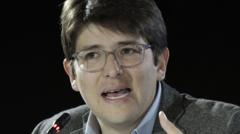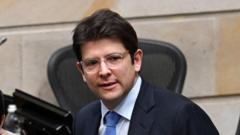A recent draft executive order from the Trump administration outlines a sweeping reorganization of the U.S. State Department, aimed at a more streamlined approach to foreign affairs.
Draft Order Proposes Major Changes to U.S. State Department Operations

Draft Order Proposes Major Changes to U.S. State Department Operations
A clear vision emerges to restructure diplomatic efforts, impacting foreign service and humanitarian cases.
April 20, 2025, marks a pivotal moment as the proposed executive order calls for the near-total elimination of Africa operations within the State Department, along with the shutdown of embassies and consulates throughout the continent. It also targets the closure of offices dealing with critical issues such as climate change, human rights, and refugee affairs. According to the 16-page draft obtained by The New York Times, the reorganization is framed as a means to eliminate “waste, fraud and abuse” and to foster a “disciplined reorganization” of the department.
If signed by President Trump, the executive order mandates that the changes be implemented by October 1, leading to anticipated layoffs of both foreign service officers and civil service employees within the agency. Some officials, both current and former, indicate that the restructuring could initiate a wave of paid leave and termination notices for numerous staff members.
The draft order intriguingly proposes an end to the foreign service exam for those aspiring to become diplomats, with new hiring criteria defined around "alignment with the president’s foreign policy vision." Moreover, it encourages the department to enhance its utilization of artificial intelligence for drafting official documents, policy development, and operational planning.
This reshaping of the State Department not only stands to shift the dynamics of U.S. foreign policy but also redefines the future of diplomacy in an increasingly complex global landscape.
If signed by President Trump, the executive order mandates that the changes be implemented by October 1, leading to anticipated layoffs of both foreign service officers and civil service employees within the agency. Some officials, both current and former, indicate that the restructuring could initiate a wave of paid leave and termination notices for numerous staff members.
The draft order intriguingly proposes an end to the foreign service exam for those aspiring to become diplomats, with new hiring criteria defined around "alignment with the president’s foreign policy vision." Moreover, it encourages the department to enhance its utilization of artificial intelligence for drafting official documents, policy development, and operational planning.
This reshaping of the State Department not only stands to shift the dynamics of U.S. foreign policy but also redefines the future of diplomacy in an increasingly complex global landscape.





















